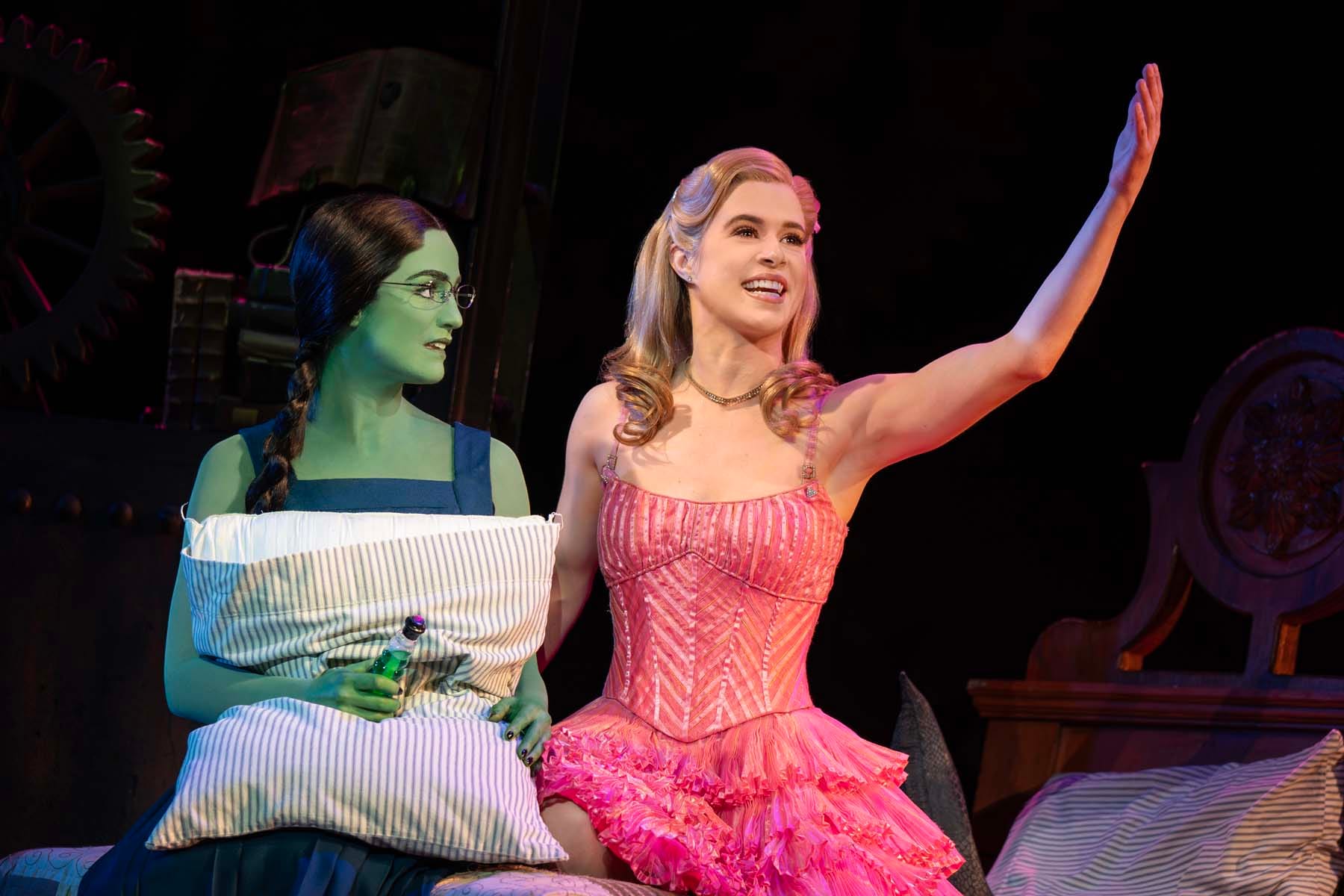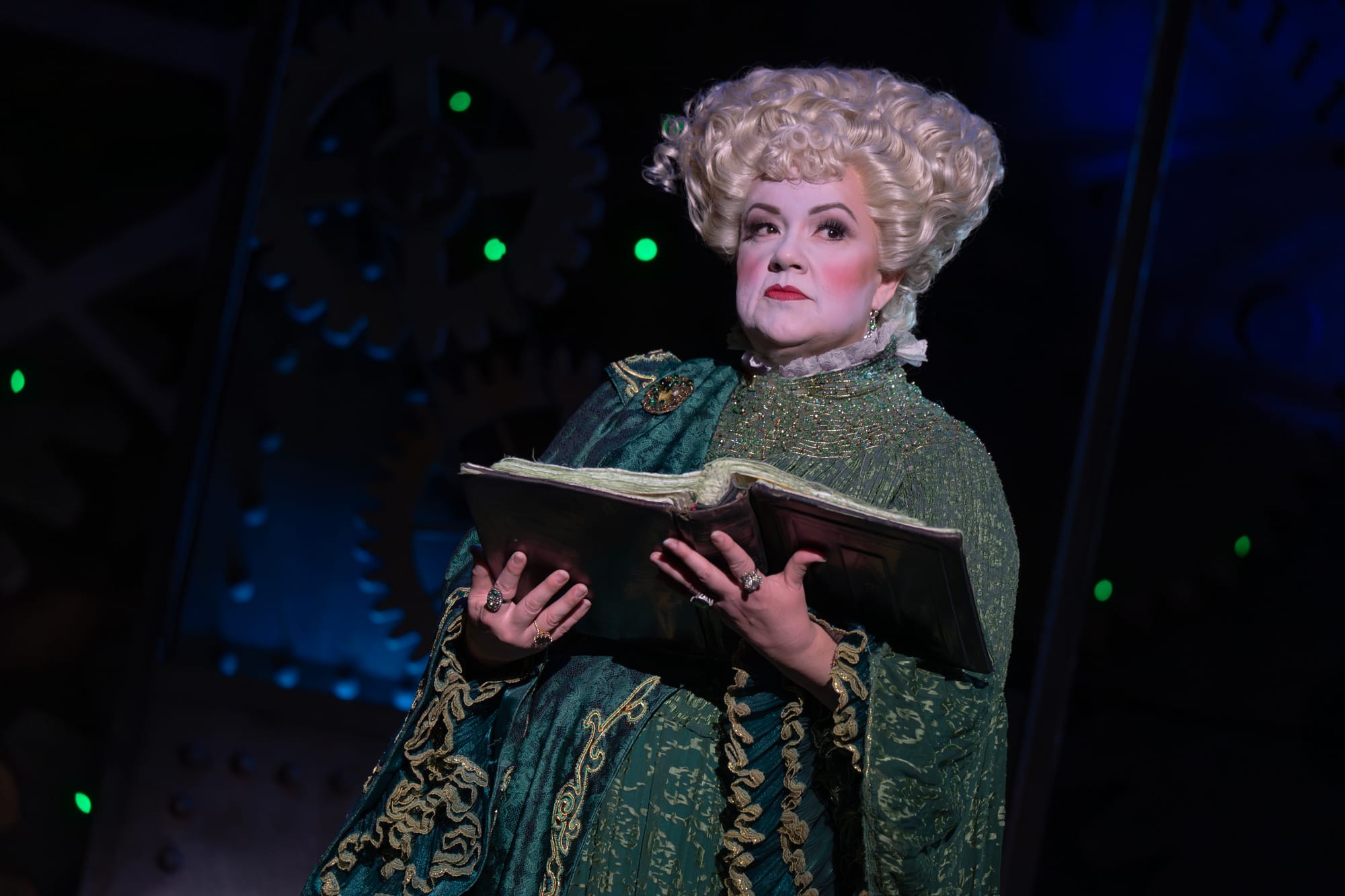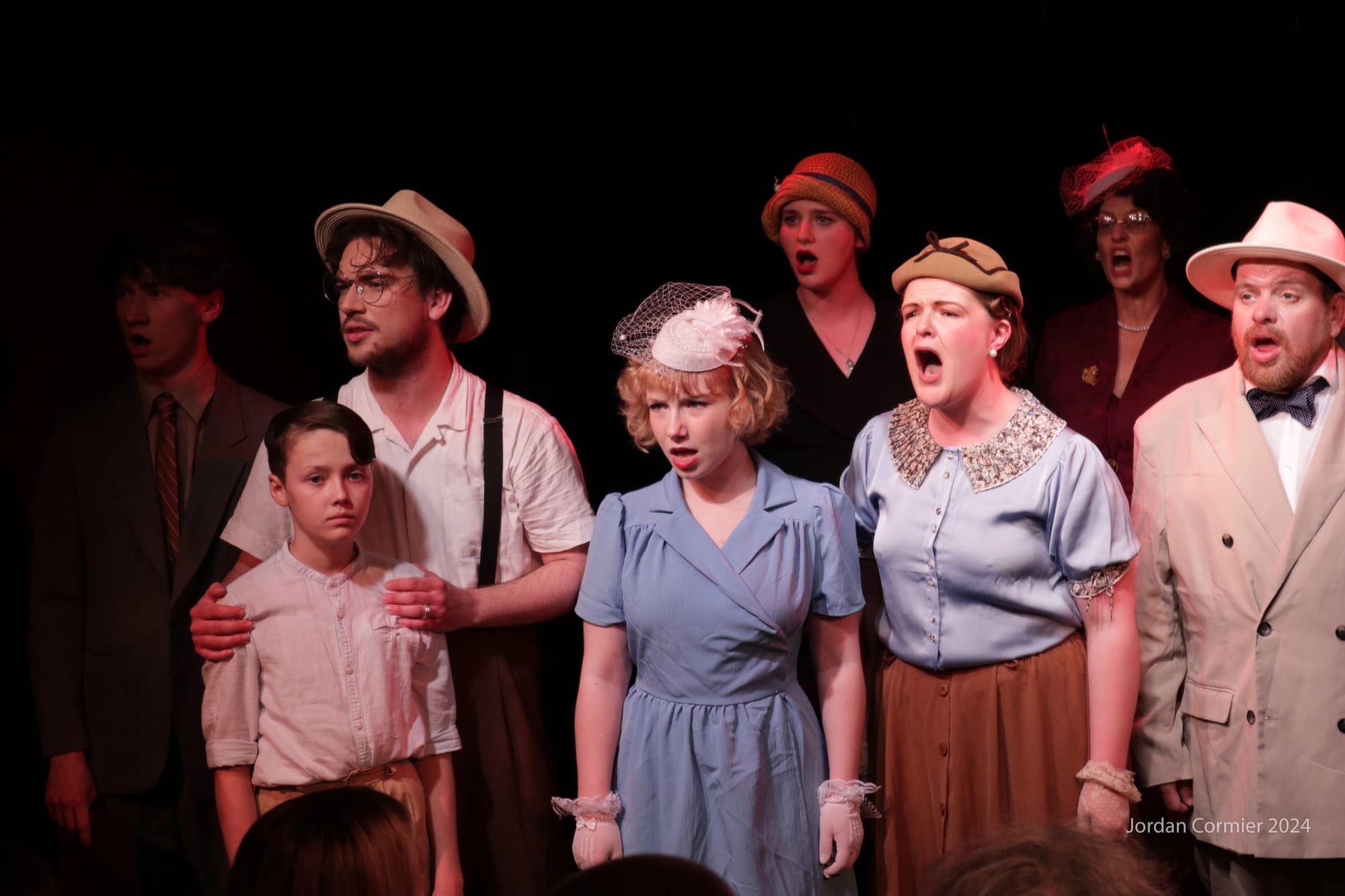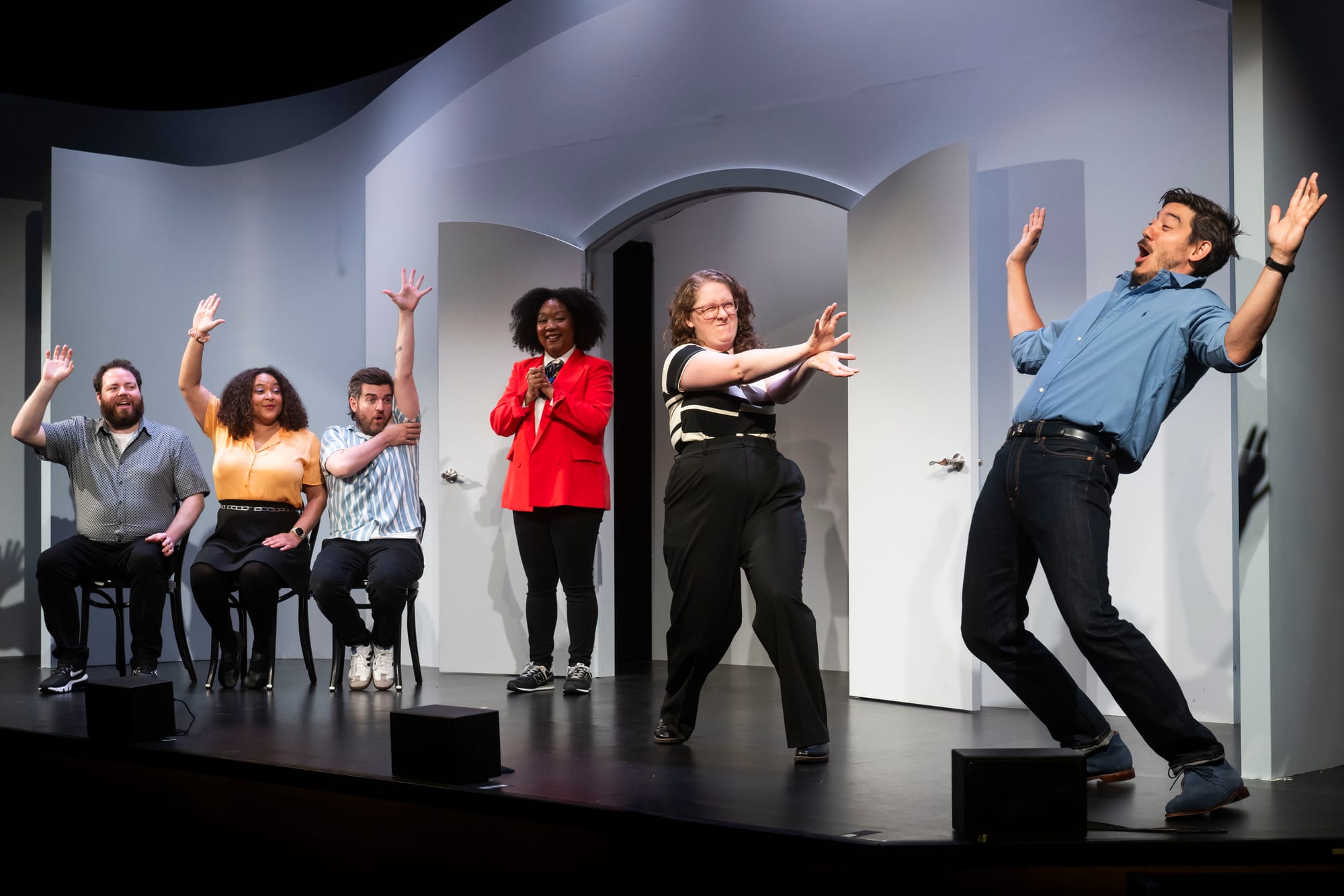Musicals! Musicals! Musicals!
Reviews of My Fair Lady, Wicked, The Last Timbit, Tommy Rhodes, a Renée Elise Goldsberry doc, the new Second City show and two views on the Tina Turner show

This time of year, musicals seem especially popular. Is it the heat? The end of the "regular" theatre season? The influx of tourists? Whatever. The best musicals give us lots of reasons to sing and dance (while leaving the theatre, that is, or silently, in our seats).
Here are some thoughts on a few musicals: classic, near-classic and, well, freshly brewed.
The bonafide classic: My Fair Lady at the Shaw Festival
For some reason, the Shaw Festival's first and only staging of My Fair Lady, Lerner and Loewe's adaptation of Shaw's Pygmalion, happened in 2011. Until this season. And what a revival it is. (Rating: ✭✭✭✭)
Co-directors Tim Carroll and Kimberley Rampersad haven't done anything radical to the show, but why should they? The tale of stuffy, pedantic phonetics professor Henry Higgins's (Tom Rooney) attempt to pass off Cockney flower girl Eliza Doolittle (Kristi Frank) as a well-born woman is so beautifully constructed it doesn't need modern embellishments or commentary.
The trick, I think, is in making the priggish Higgins's behaviour sympathetic, or at least show the insecure man being unaware of his emotional and human needs. In Tom Rooney's superb, nuanced performance, his social awakening is as thrilling – and as moving – as Eliza's more formal tutoring.
The production works best when text, direction, choreography and performance work together to produce something sublime, such as when, near the end, Higgins is so confounded by missing his former student that the world around him is empty. The way Carroll and Rampersad quickly bring in pieces of Lorenzo Savoini's set to recreate his familiar study at that moment is, literally, breathtaking.
Some might argue that Eliza is a passive vessel who's "saved" by Higgins. Not so here, where Frank's enterprising young woman knows what she wants – her "Wouldn't it Be Loverly?" is a classic "I Want" song – and goes about getting it, and then wondering if it's worthwhile.
Is there a more bittersweet moment in the show than when she revisits her old neighbourhood and realizes her former friends don't recognize her? She doesn't fit in, in the same way that Higgins, who grew up with privilege, is an outsider among his own class because of his education.
Some sections don't quite work. The act two ball doesn't quite seem as lavish or as well-attended as it should. The Ascot scene, however, is brilliantly realized in the contrast between the clipped, repressed, upper-class crowd reaction to the races and Eliza's exuberant outburst. This is art showing, not telling.
There's also a bizarre Parisian feel to Alfred Doolittle's (David Adams) "Get Me to the Church on Time" – did he and his pals end up crossing the English Channel before his nuptials? And David Alan Anderson doesn't bring much shading or complexity to his Colonel Pickering.
But the other roles are beautifully realized: Sharry Flett makes a sympathetic, understanding Mrs. Higgins; Patty Jamieson ensures Mrs. Pearce's every entrance, exit and side-eye is a delight; and Taurian Teelucksingh's Freddy has such a beautiful voice you almost forget his character lacks much dimension.
Any My Fair Lady depends on the chemistry between its two leads, and Rooney (Allan Louis takes over the role from October 17) and Frank make a watchable, spirited pair. Their final scene is so cleverly staged that it nicely suggests the sly fun in store for the fictional couple after the curtain comes down.
My Fair Lady continues at the Shaw Festival's Festival Theatre until December 22. See info here.

The new classic: the Wicked tour
After seeing the second North American national tour of the Broadway musical Wicked (Rating: ✭✭✭), I now understand why Jon M. Chu's upcoming movie adaptation is going to be split into two parts. (The first comes out November 27, the second a year later.)
There are so many characters and plot strands – not to mention a few forgettable songs among the hits – that this Wizard of Oz prequel should benefit from the extra time to breathe and flesh out some supporting characters and storylines. Plus, film is a visual medium, and I expect Chu, who did such a fine job with In the Heights, will offer up some impressive eye candy to honour the beloved 1939 Technicolor classic – and go way beyond. (The first trailer is pretty impressive.)
Disclosure: it's taken me several viewings to warm to the musical by Stephen Schwartz (music, lyrics) and Winnie Holzman (book) based on the novel by Gregory Maguire. For one thing, the lack of a good opening number has always seemed an early, unnecessary stumbling block. Plus, the introduction of future Wicked Witch of the West Elphaba's origin story in the first scenes has always felt like it belonged much later in the show.
But the story about friendship, fitting in and the superficial markers of popularity have made Wicked endure and resonate for years – it's no surprise that book writer Holzman penned one of the all-time best TV series about adolescent life. And the material's focus on political leaders' penchant for demonizing and scapegoating the "other" feels depressingly relevant today.
Lauren Samuels is a strong, characterful Elphaba, handling both her dramatic arc and her soaring numbers with enviable ease (her British accent only occasionally slips through). Austen Danielle Bohmer sells Glinda's comic notes better than her musical ones – some of her high notes sounded thin and screechy at the performance I attended. (She's more of a belter than a true high soprano.)

Xavier McKinnon makes his Fiyero awfully attractive, adding real physical grace to his "Dancing Through Life" number, one of the few ensemble pieces in the show that satisfies. Theatre vets Aymee Garcia and Blake Hammond are so experienced they wring every drop of nuance from their supporting characters Madame Morrible and Oz.
Unfortunately, Alex Vinh's Boq and Erica Ito's Nessarose get lost in the hubbub. In the stage show, their plots are rushed through to tie up all the loose ends in the second act and connect it to its original source material. These are two characters who should benefit most from the two-film adaptation; let's hope it happens.
Wicked runs until July 21 at the Princess of Wales Theatre. See info here.

The new musical, part one: The Last Timbit at the Elgin
Considering the fact that it came together in about six months, a fraction of the time most musicals take to get to the stage, The Last Timbit (Rating: ✭✭✭✭), affectionately known as "the Tim Hortons" musical since it made headlines in April, is a remarkable achievement.
Sure, the setup and plot occasionally feel contrived, and the product placement is unashamedly front and centre. This is, after all, a musical paid for by a major corporation meant to celebrate a big milestone; the subtitle is "A 60th Anniversary Musical."
But within those parameters, there's so much good work that ought to be properly acknowledged, even celebrated. Also, with theatres struggling and public funds and private donations shrinking, it seems like one legitimate way to develop and encourage new theatre. Especially when the talent you've hired (onstage, backstage, producing) is as good as the folks assembled for this show.
The premise is based on a real-life event. During a 2010 blizzard, dozens of strangers holed up in a Sarnia, Ont. Tim's for nearly 24 hours to wait out the storm.
Composer/lyricists Britta and Anika Johnson and book writer Nick Green have transplanted the event to contemporary Hamilton, Ont. – home of the very first Timmies – and have thrown together an eclectic group of strangers waiting for the storm to clear.
We begin in a car with recently divorced mother Michelle (Chilina Kennedy) and her angst-ridden teenager Olivia (Kaya Kanashiro), who are arguing during the storm before Michelle is forced to pull into the Tim's.
Inside, they find a bunch of people who are concerned, tired and clearly done with being stranded together. Friends Ellen (DeAnn DeGruijter) and Kathy (Barbara Fulton) are members of a choral group who've taken a detour, and are possible fugitives as a result. Stylish influencers Vince (Andrew Broderick) and Nicole (Kimberly-Ann Truong) were on their way to a big, splashy gala. And singletons Shane (Jake Epstein), Chloe (Sara Farb) and Tim's regular Anton (Peter Millard) all have their wants and needs, which will soon be revealed.
Manager/owner Monty (Eric Craig, filling in for Sterling Jarvis) and employee Charlie (Danté Prince) have had their hands full keeping everyone busy and safe, but somehow they've just realized there's only one Timbit left. (There seem to be enough ingredients for sandwiches, however.)
And so Monty has come up with a three-part competition to win that final little piece of fried dough. (Hey, it's a Birthday Cake Timbit, so it's extra special.) In between each silly leg of the challenge, we learn about these strangers.
The competition is the weakest and least plausible part of the book, but it gives the show a title and a structure, and it gives the characters a way to separate and bond in different groupings. Book writer Green does an efficient job of introducing us to nearly a dozen characters and pretty well tying their stories up by the end.
Sure, there are a few loose threads. There doesn't seem to be a TV or even radio for people to be hearing weather reports. And no one seems particularly concerned about contacting loved ones via cellphone. I also wondered about the state of the washrooms. (Come From Away dealt with that issue in a couple of clever scenes.)
But this is nit-picking. The songs range from the mock grandeur of the opening anthem to the infectious bop that is "Party of the Year," Vince and Nicole's big, splashy duet. Olivia's song about being smitten with a member of the school band is sweet and funny, and here and elsewhere director Brian Hill and choreographer Genny Sermonia boost the scene by having the ensemble shadow the character and provide background harmonies.
There's a lot of pent-up passion and urgency in the music for "Perfect," about Chloe's desire to make friends, and Farb nails it, mixing pathos, desperation and even a little hockey humour. The composers intrinsically match musical style and emotional content with character. Millard's gentle ode to his Tim's routine without his wife is simple, unpretentious and completely heartbreaking.
This one show doesn't solve the "Where is theatre heading?" problem. But it does illustrate what's possible when artists are given resources, respect and a limited amount of time to work on something.
When I interviewed members of the cast and creative team a month ago, Britta Johnson (Life After, Kelly v. Kelly) said it had been "the most unbelievably joyful and surprising experience of my career."
It shows.
The Last Timbit ran June 26 to 30 at the Elgin Theatre

The new musical, part two: Tommy Rhodes at the Red Sandcastle
There are so many talented Gen Z artists working in Toronto musical theatre, like Shifting Ground Collective (Ordinary Days, Merrily We Roll Along) and Bowtie Productions (Falsettos).
Now you can add Basement Productions to that list. Their production of Tommy Rhodes (Rating: ✭✭✭✭), dubbed a "true crime musical drama," is impressive, not just because of the youth of its creators but for the scope and scale they're working in. This is no modest chamber musical.
The creative team – composer/lyricist and director Mateo Chavez Lewis, who co-wrote the book with Aveleigh Keller (who also wrote the story) – was inspired by a real-life mystery a century ago in which a young boy named Tommy (Colm Sawyer) disappeared on a fishing trip with his father Henry (Dante Toccacelli).
Henry and wife Leslie (Jillian Robinson) are devastated, of course, Henry wracked with guilt over losing him and Leslie convinced Tommy is still alive (she refuses to attend his symbolic funeral, held by the sympathetic townsfolk).
But less than a year later, someone brings what appears to be Tommy back to town, even though he seems nothing like the exuberant Rhodes child and even lacks a distinguishing physical feature. Things get more complicated when another woman, Frances Edwards (Bella Wolder), claims the boy is her own missing child, Patrick.
All of this would be an ambitious enough tale to tell. But Lewis and Keller have interwoven this story with that of Charlotte (Katie Crompton), Tommy's granddaughter, who is so obsessed with the case that she's distracted from her pregnant wife Lisa's (Anikka Hanson) impending delivery. Charlotte acts as narrator and even watches on during the period sequences, as if trying to figure out the puzzle. Since Tommy's identity is in question, everything she believes about herself is up in the air – or so she thinks.
The result is a rich, complex show that touches on themes of family, class and belonging. Lewis's songs are varied and beautifully detailed, giving each character – even the supporting ones – proper dimension, motivation and sympathy.
While the Red Sandcastle Theatre is small, the only time the playing area feels cramped is during the court scene, but even then Lewis finds ingenious ways to work around the space's limitations.
I hope the show continues to evolve. I'd love to see it get a larger production, deserving of the gifted creators and cast.
Tommy Rhodes ran June 1 to 22 at the Red Sandcastle.

A doc about a musical icon: Satisfied
If you've ever wondered what it's like to combine a busy theatre performing career with motherhood and marriage, the excellent new documentary Satisfied (Rating: ✭✭✭✭) should, well, satisfy you.
Chris Bolan and Melissa Haizlip's film, which recently premiered at the Tribeca Film Festival, follows Renée Elise Goldsberry as she deals with being in one of the most iconic Broadway shows ever while having a son and a new baby daughter.
As the future Hamilton actor tells us at the top of the film, growing up in Houston and Detroit, she always had two big dreams in life: to be a mother and to have a career as a singer and actor.
She'd realized the second part of that dream pretty early on, with roles in a Public Theatre musical version of Two Gentlemen of Verona (starring Norm Lewis, Rosario Dawson and a fresh-out-of-theatre-school Oscar Isaac, among others), The Lion King, Good People, The Color Purple and Ally McBeal. But after meeting her husband (and all-round saint, if this film is any indication), Alexis Johnson, she was finding it difficult to conceive.
After at least five miscarriages, some recounted in frank detail (one happened on a day when she rushed from the set of One Life to Live to perform in The Color Purple), she finally discovered she was pregnant.
She put her stage career on hold to raise her son, and in February of 2014 went to Ethiopia to adopt a baby girl. Then, not too long later, she got a call to audition for something called "The Hamilton Mixtape workshop."
As the mother of an infant, she firmly refused many requests, but her agent finally demanded she listen to a demo of a song from the show: an early version of Angelica Schuyler's song "Satisfied." She was intrigued, and after learning the fiendishly difficult song in a few hours, auditioned.
We know, of course, that she booked the role, and it's in the workshop process that she realizes just how revolutionary this musical could be. When news breaks that the show is heading to the Public Theater, she isn't sure she'll be included in the cast. How heartbreaking would it be to help create this role and not go with it all the way?
While she's doing all this work, she's also trying to raise her children, all of which gets more complicated when she lands the part and has to start performing at night; things get even more hectic when it transfers to Broadway and she barely has time to see her children during tech week and then its hectic, headline-making run.
What makes the film so special is the hours of vlogs Goldsberry kept during that time, capturing auditions, rehearsals, birthdays and special nights – some triumphant and inspiring (lots of footage of performing to crowds outside the theatre) and some humbling (flubbing the rap one night in her big number, "Satisfied").
There's a remarkable section late in the film in which she goes back and visits her old school drama teacher who introduced her to theatre and had the boldness to cast her, a young Black girl, in the lead in a school production of Oklahoma!
And there's one event recounted mid-film that I had no prior knowledge of – it will make anyone, artist or not, wonder how they'd deal with the situation.
That's the beauty of this film – which incidentally includes Goldsberry's musical theatre peers Kelli O'Hara and Audra McDonald, both working moms themselves, as executive producers. Whether you have any connection to the theatre or not, this moving and honest look at work and parenthood will leave you more than satisfied.

Not a musical but there's one knockout musical number: the new Second City mainstage show
Whenever there's a lot of change in a Second City mainstage cast, it signals an opportunity for growth and renewal. While I'm sad that the gifted Liz Johnston and Ron Pederson, both of whom (I think) only got to create and perform one show (last fall's quirky Chaos Menu: Disordered Up) are gone, I'm pleased the new crew work together so well in All Messed Up & Nowhere to Go (Rating: ✭✭✭✭).
Returning from last year are Coko Galore and Devon Henderson; making their mainstage debuts are Conor Bradbury, Christian Smith, Tiyawnda and Scott Yamamura. Their chemistry is off the charts.
There's something for everyone in this revue, the mainstage directorial debut of former mainstage writer/performer (and ace improviser) Kyle Dooley.
There's lots of biting social satire, especially about economic uncertainty, in the sketch in which a poor woman (Henderson) is invited to two destination weddings by her more well-off friends. It's also there in a sketch in which a couple (Bradbury and Henderson) want to split up but realize they can't because, with inflation, together they make one salary. This is comedy that's almost too true.
These two scenes pay anticipate the superb second-act sketch in which Henderson and Yamamura play two actors performing for a classroom of kids. The students' questions start out cute and innocent, but become more awkward as they grill the actors about the economic viability of a career in the performing arts.
Fans of physical comedy will love a brief sketch in which Yamamura plays a sad plastic lid that lacks its container for completion. Another scene finds a group of women asking an innocent bystander (Smith) to take a photo of them only to keep criticizing his cellphone camera skills. This is comedy that transcends language. And Smith and Bradbury are jaw-droppingly good in a very physical bit featuring a father and son in a car. And the ending of a scene at a party in which Galore plays a fancy blender is so good I can't spoil it.
At a time when social situations are so fraught with potential danger, the recurring bit in which Smith plays a man who tries to prevent awkward situations from happening – all to a riff from Bruno Mars's "Grenade," appropriately enough – hit home with maximum hilarity.
There's lots of shrewd observation about the differences between how women and men interact socially in a pair of clever scenes. Bradbury, who will be performing as part of Sex T-Rex this month at the Toronto Fringe, excels as a restaurant manager with anger management issues.
And a sketch that is so good that I'd love to watch variations of it in future revues is one in which Galore and Smith play codependent friends who criticize everything but have issues with confronting people. The second act is funnier than the first, with lots of clever callbacks and payoffs to earlier sketches.
Each member has a chance to shine, none more brightly than Henderson when she sings a song about being the "only white girl" in the cast, a number that gets funnier and sharper when the other two join in as backup.
To reference the title, all messed up? Yes. But so are our times. And you should definitely go see it.
All Messed Up & Nowhere to Go continues at the Second City Toronto for a limited run. See info here.

A disappointing bio jukebox musical & a brilliant podcast about musicals
Last week I reviewed the underwhelming jukebox musical Tina: The Tina Turner Musical for the Toronto Star. Here's my review.
For a second opinion, I recommend the entertaining and informative episode about the show on the podcast Off 2 Broadway. Besides shouting out my review (!), hosts Tara and Stefania discuss a ton of things about the show, including the double casting of the demanding title role, the difficulties of the bio jukebox musical as a genre, and the glaring problems in both the book and direction.
I LOL'd several times, especially when they wondered what happened to the character of Rhonda (I wondered the same thing but cut it from my review for space), and bring up some really good points about needing to have a scene with abuser Ike in the second act. Their confusion about certain characters and plot points – Who's Ronnie? – made me repeatedly nod my head. And their thoughts about design, particularly projections, are really smart.
They also discuss practical things like the seating configurations at the CAA Ed Mirvish Theatre. After digging deeper into their show's archives, I discovered they frequently discuss rush, preview and standing room tickets, which is invaluable information for theatregoers.
I've already listened to a couple of back episodes, including one on 11 o'clock numbers, the films La La Land and Dear Evan Hansen and one (of two) on the recent Tony Award nominations (I think they're based in Toronto but make frequent trips to New York and elsewhere).
The fact that the two friends began the podcast before the pandemic means it wasn't just a lockdown project. Their enthusiasm, wit and knowledge – not to mention occasional guests, including Robert Markus, Jacob MacInnis and two members of the recent cast of Six – are infectious.
The show has a YouTube channel here, and you can find the podcast wherever you get your podcasts. They end each episode with their weekly obsessions. I've gotta admit: my obsession this week is Off 2 Bway.
Note: I was hoping to write a preview of my most-anticipated shows at the Toronto Fringe, which begins today. Alas, I didn't get around to it. But I'll be writing capsule reviews for the Toronto Star and Parton & Pearl. I'll link to those, and review other shows and news, in upcoming posts this week and next.
So please come back here. And see you in line and at the Fringe Club.
